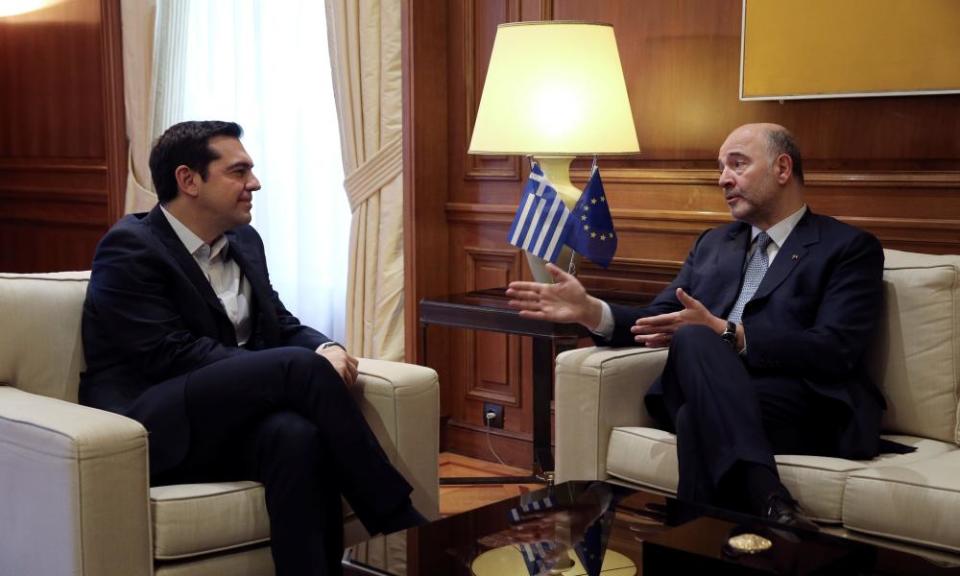Greece standoff over €86bn bailout eases after Brussels deal

Greece’s bailout inspectors are returning to Athens to seek changes to the country’s tax, pensions and labour market laws in a sign that the Greek prime minister, Alexis Tsipras, will give way to European pressure for deeper reforms.
His government agreed at a meeting of eurozone finance ministers on Monday to talks on big economic reforms in exchange for progress on releasing the next instalment of bailout funds. In return, Europe signalled a winding back of austerity measures for the struggling nation, in a move that could end a dispute between EU creditors and the International Monetary Fund over how to deal with Greece.
But the announcement sparked anger in Greece, where the main opposition party accused the government of caving in while the economy was weak.
“The government is celebrating the return of the institutions to Greece while the economy is sinking,” said the centre-right New Democracy group.
Senior EU officials promised economic pressures would be lifted. Pierre Moscovici, the European commissioner for economic affairs, said: “We need to show [the Greek people] that there is light at the end of the tunnel of austerity. Everyone has agreed on this fundamental principle.”
Officials from the European commission, the European Central Bank, the IMF and the European Stability Mechanism (EU bailout fund) will arrive in Athens “in the very short-term” to work with the Greek government on reforms to tax, pensions and labour markets, said Jeroen Dijsselbloem, the Dutch finance minister who chairs the Eurogroup.
Speaking after the meeting in Brussels, he said it was too early to make a decision on unlocking the next tranche of Greece’s €86bn (£73bn) bailout, but he hoped agreement on reforms would make a disbursal of funds possible. Greece was represented at the meeting by its finance minister, Euclid Tsakalotos.
The return of the creditors to Athens has raised hopes they will agree among themselves on how to handle Greece’s debt mountain. The IMF has so far declined to get involved in the latest bailout because it believes that refusing to write off some of the Greek debt burden will crush Greece’s economic prospects. In contrast, the EU institutions argue that deferring repayment terms – rather than waiving payments – will allow the Greek economy to grow and pay its dues.
Amid the deadlock, Tsipras has vowed not to accept one euro more of austerity, beyond what Athens has already agreed.
Offering some hope, Dijsselbloem picked up this demand, saying: “There will be a change in the policy mix, if you will, moving, perhaps, away from austerity and putting more emphasis on deep reforms.” But he declined to endorse Tsipras’s words and said the outcome would depend on reforms agreed.
But vague talk of ending austerity did not go down well in Greece. “As was expected the … government accepted the legislation of a new package of unpopular measures that will be enforced after 2018 plus all those that are included in the current programme,” said the communist KKE party.
Calling on Greeks to take to the streets in mass protest on Tuesday, the party added: “Whatever the government says about reforms without fiscal cost and counter measures is just another attempt at deceiving people, only this time it can’t persuade anyone.”
The Greek finance ministry has said the government’s debt load is now €226.36bn after increasing by €2.65bn on the previous quarter.
Dimitris Tzanakopoulos, a government spokesman, said what had been achieved in Brussels was an “extremely important development” that finally put dangerous scenarios of Greece leaving the euro to rest. Where revenue-raising measures were imposed, others would be cut, he said.
Greece faces a €7.4bn debt repayment bill in July, making the summer an unofficial deadline for an deal on unlocking the second instalment of the current bailout, the country’s third.
Greece’s creditors are optimistic. The country paid €2bn to the European Stability Mechanism on Monday, hailed by the fund’s managing director, Klaus Regling, as a sign that Greece was a reliable partner.
He told the German newspaper Bild that Greece was unlikely to need all of the €86bn fund because the Greek budget was developing better than expected – a view that contrasts with some market watchers who think the country is heading for its fourth bailout.
The latest eurozone meeting had been seen as the last chance to sort out Greek reforms before Europe enters a critical electoral cycle, starting with Dutch elections on 15 March.
Eurozone leaders are now playing down talk of any imminent need for an agreement.
“There is no need for a disbursement in March, April or May. Don’t create deadlines where there are none,” said Dijsselbloem, promising that the cash would be available on time.

 Yahoo Finance
Yahoo Finance 